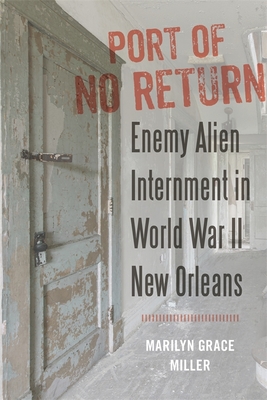Port of No Return: Enemy Alien Internment in World War II New Orleans

Port of No Return: Enemy Alien Internment in World War II New Orleans
While most people are aware of the World War II internment of thousands of Japanese citizens and residents of the United States, few know that Germans, Austrians, and Italians were also apprehended and held in internment camps under the terms of the Enemy Alien Control Program. Port of No Return tells the story of New Orleans's key role in this complex secret operation through the lens of Camp Algiers, located just three miles from downtown New Orleans.
Deemed to be one of two principal ports through which enemy aliens might enter the United States, New Orleans saw the arrival of thousands of Latin American detainees during the war years. Some were processed there by the Immigration and Naturalization Service before traveling on to other detention facilities, while others spent years imprisoned at Camp Algiers. In 1943, a contingent of Jewish refugees, some of them already survivors of concentration camps in Europe, were transferred to Camp Algiers in the wake of tensions at other internment sites that housed both refugees and Nazis. The presence of this group earned Camp Algiers the nickname "Camp of the Innocents." Despite the sinister overtones of the "enemy alien" classification, most of those detained were civilians who possessed no criminal record and had escaped difficult economic or political situations in their countries of origin by finding a refuge in Latin America. While the deportees had been assured that their stay in the United States would be short, such was rarely the case. Few of those deported to the U.S. during World War II were able to return to their countries of residence, either because their businesses and properties had been confiscated or because their home governments rejected their requests for reentry. Some were even repatriated to their countries of origin, a possibility that horrified Jews and others who had suffered under the Nazis. Port of No Return tells the varied, fascinating stories of these internees and their lives in Camp Algiers.PRP: 259.10 Lei
Acesta este Prețul Recomandat de Producător. Prețul de vânzare al produsului este afișat mai jos.
233.19Lei
233.19Lei
259.10 LeiLivrare in 2-4 saptamani
Descrierea produsului
While most people are aware of the World War II internment of thousands of Japanese citizens and residents of the United States, few know that Germans, Austrians, and Italians were also apprehended and held in internment camps under the terms of the Enemy Alien Control Program. Port of No Return tells the story of New Orleans's key role in this complex secret operation through the lens of Camp Algiers, located just three miles from downtown New Orleans.
Deemed to be one of two principal ports through which enemy aliens might enter the United States, New Orleans saw the arrival of thousands of Latin American detainees during the war years. Some were processed there by the Immigration and Naturalization Service before traveling on to other detention facilities, while others spent years imprisoned at Camp Algiers. In 1943, a contingent of Jewish refugees, some of them already survivors of concentration camps in Europe, were transferred to Camp Algiers in the wake of tensions at other internment sites that housed both refugees and Nazis. The presence of this group earned Camp Algiers the nickname "Camp of the Innocents." Despite the sinister overtones of the "enemy alien" classification, most of those detained were civilians who possessed no criminal record and had escaped difficult economic or political situations in their countries of origin by finding a refuge in Latin America. While the deportees had been assured that their stay in the United States would be short, such was rarely the case. Few of those deported to the U.S. during World War II were able to return to their countries of residence, either because their businesses and properties had been confiscated or because their home governments rejected their requests for reentry. Some were even repatriated to their countries of origin, a possibility that horrified Jews and others who had suffered under the Nazis. Port of No Return tells the varied, fascinating stories of these internees and their lives in Camp Algiers.Detaliile produsului










